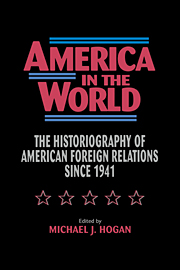Book contents
- Frontmatter
- Contents
- Preface
- The Authors
- Part One The State of the Art
- Part Two The Historiography of American Foreign Relations since 1941
- 6 The Historiography of American Foreign Relations: An Introduction
- 7 A Half-Century of Conflict: Interpretations of U.S. World War II Diplomacy
- 8 The Decision to Use the Bomb: A Historiographical Update
- 9 Origins of the Cold War in Europe and the Near East: Recent Historiography and the National Security Imperative
- 10 Making Known the Unknown War: Policy Analysis of the Korean Conflict since the Early 1980s
- 11 Eisenhower Revisionism: The Scholarly Debate
- 12 John F. Kennedy as World Leader: A Perspective on the Literature
- 13 The Unending Debate: Historians and the Vietnam War
- 14 Complaints, Self-Justifications, and Analysis: The Historiography of American Foreign Relations since 1969
- 15 An Emerging Synthesis? U.S.–Latin American Relations since the Second World War
- 16 Gideon's Band: America and the Middle East since 1945
- 17 The Cold War in Asia: The Elusive Synthesis
- 18 The Power of Money: The Historiography of American Economic Diplomacy
- 19 Coming in from the Cold War: The Historiography of American Intelligence, 1945–1990
- Index
9 - Origins of the Cold War in Europe and the Near East: Recent Historiography and the National Security Imperative
Published online by Cambridge University Press: 05 June 2012
- Frontmatter
- Contents
- Preface
- The Authors
- Part One The State of the Art
- Part Two The Historiography of American Foreign Relations since 1941
- 6 The Historiography of American Foreign Relations: An Introduction
- 7 A Half-Century of Conflict: Interpretations of U.S. World War II Diplomacy
- 8 The Decision to Use the Bomb: A Historiographical Update
- 9 Origins of the Cold War in Europe and the Near East: Recent Historiography and the National Security Imperative
- 10 Making Known the Unknown War: Policy Analysis of the Korean Conflict since the Early 1980s
- 11 Eisenhower Revisionism: The Scholarly Debate
- 12 John F. Kennedy as World Leader: A Perspective on the Literature
- 13 The Unending Debate: Historians and the Vietnam War
- 14 Complaints, Self-Justifications, and Analysis: The Historiography of American Foreign Relations since 1969
- 15 An Emerging Synthesis? U.S.–Latin American Relations since the Second World War
- 16 Gideon's Band: America and the Middle East since 1945
- 17 The Cold War in Asia: The Elusive Synthesis
- 18 The Power of Money: The Historiography of American Economic Diplomacy
- 19 Coming in from the Cold War: The Historiography of American Intelligence, 1945–1990
- Index
Summary
This essay examines materials published during the last decade or so on the origins of the Cold War in Europe and the Near East, with the goal of determining if something like a synthesis is emerging on the subject. Historians of America's foreign relations, particularly those of us writing on the Cold War, have struggled long and hard to forge a synthesis that integrates the domestic and international forces underlying American diplomacy. The results have not been encouraging, and there is even the possibility that such a grand, all-encompassing conceptual device does not exist.
Our analysis of recent works on the Cold War, however, does reveal a number of common factors that suggest if not a synthesis at least a dominant approach based on the national security imperative. In other words, the bulk of this work demonstrates a pervasive concern with the way that policymakers perceived global threats to the nation's security and how they responded to those threats. In the best of this work, national security is defined broadly enough to show the relation between domestic and foreign elements affecting a country's safety and to include the social, economic, political, and military considerations that influence strategy, as well as the important and often subtle cross-cultural exchanges and the interworkings of the public and private sectors of society. Defined in this manner, the concept of national security encompasses not only the varied reasoned responses to danger but also those wide-ranging irrational impulses resulting from exaggerated or erroneous perceptions and from an often-obsessive concern with the credibility of the country's commitments abroad.
- Type
- Chapter
- Information
- America in the WorldThe Historiography of US Foreign Relations since 1941, pp. 234 - 269Publisher: Cambridge University PressPrint publication year: 1996
- 2
- Cited by



